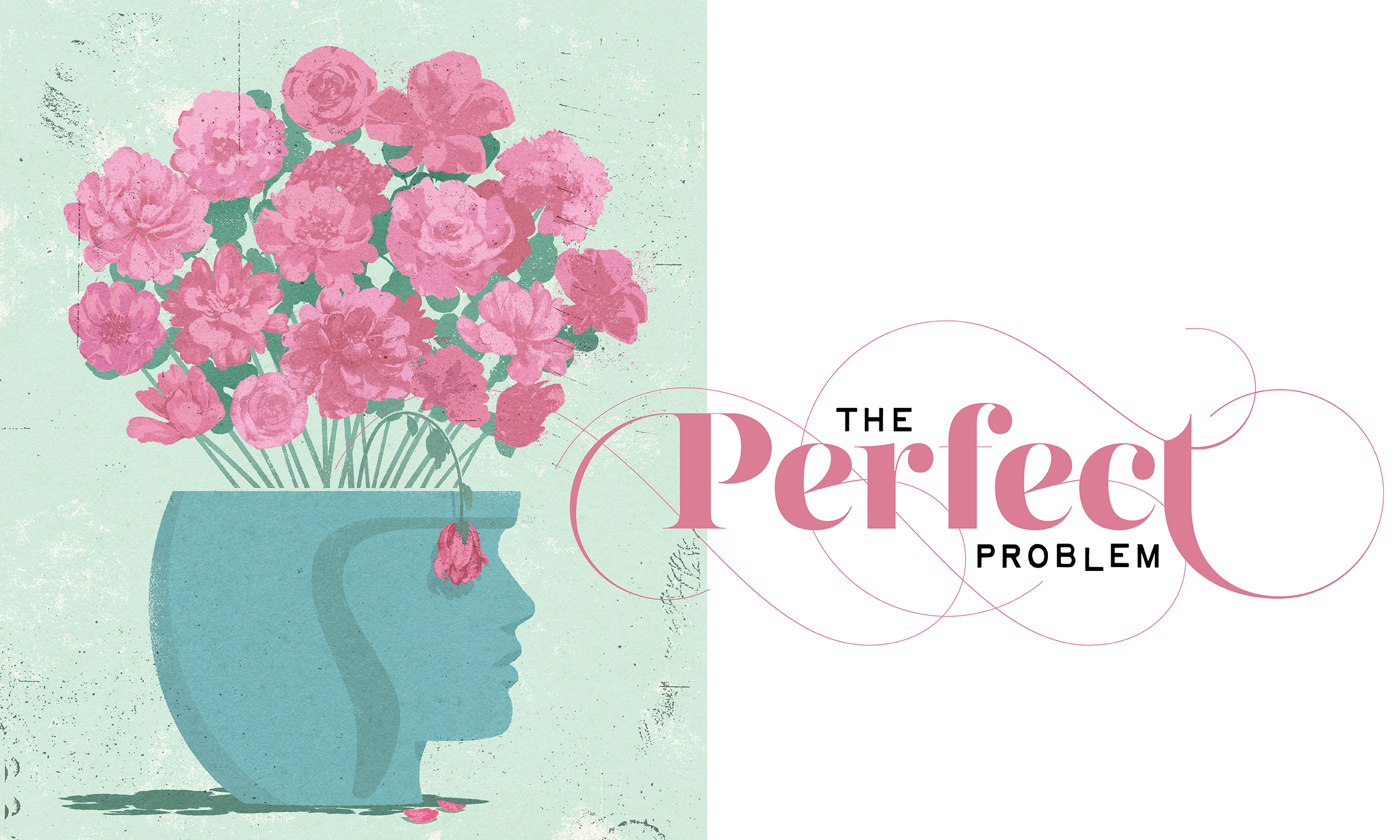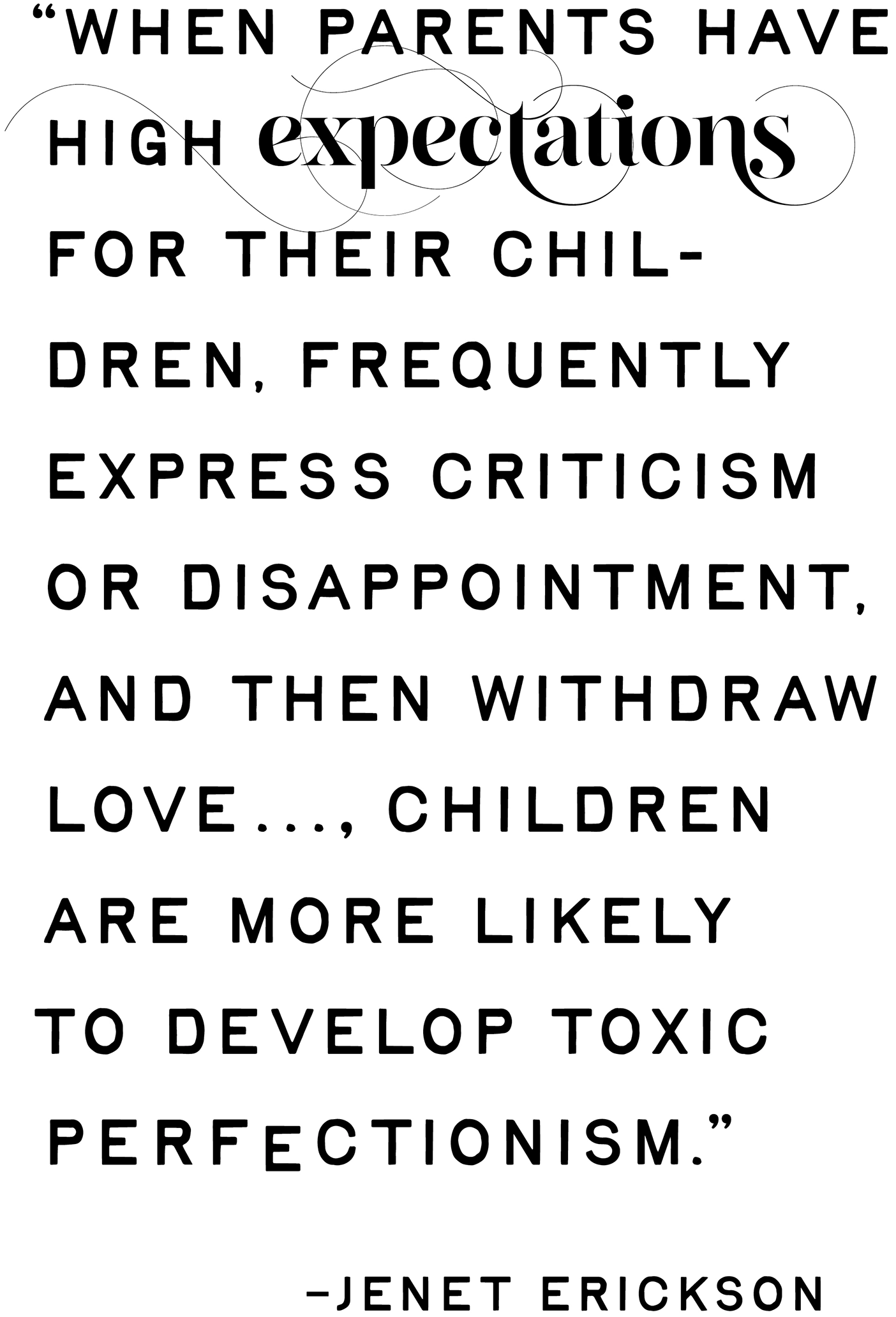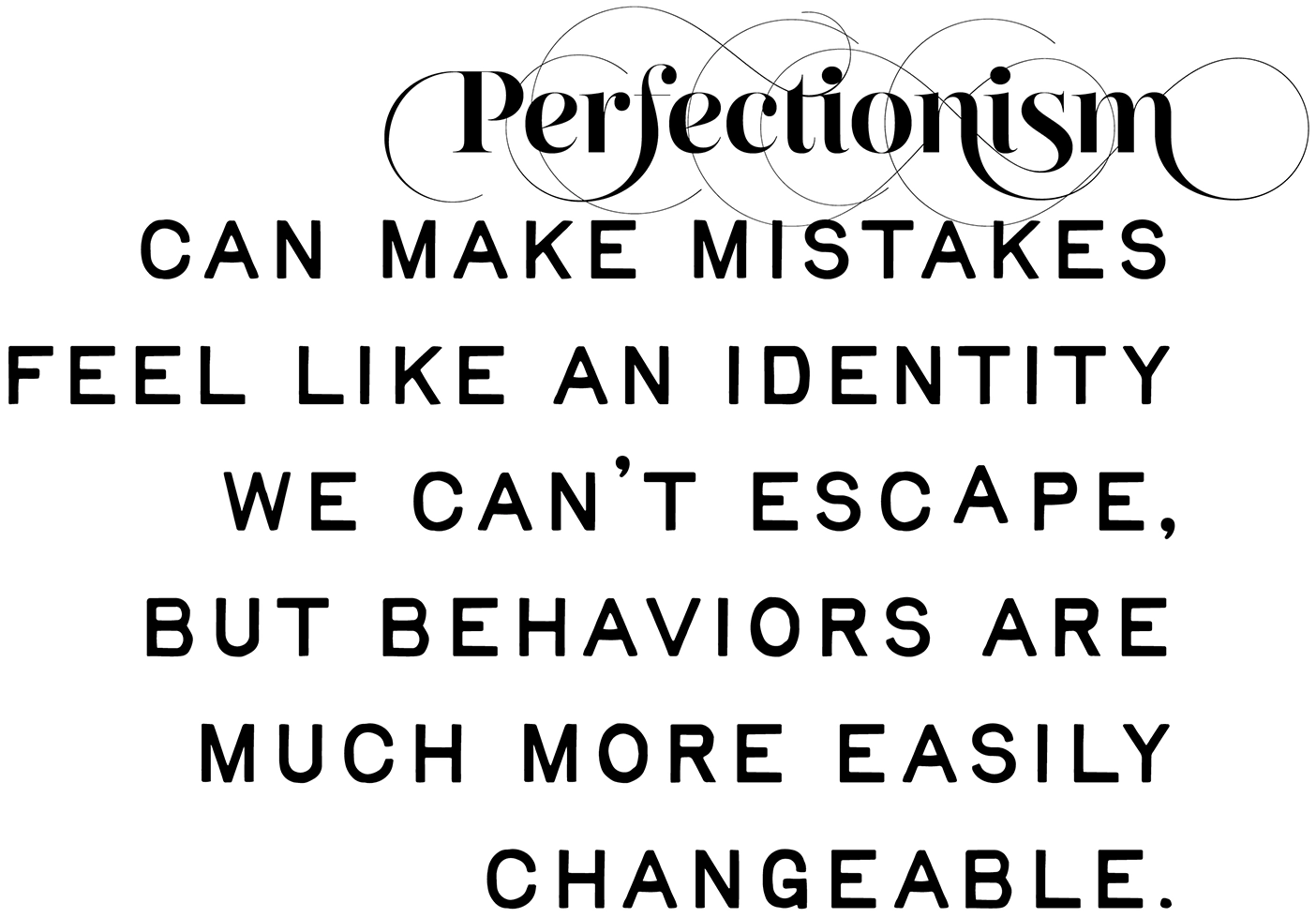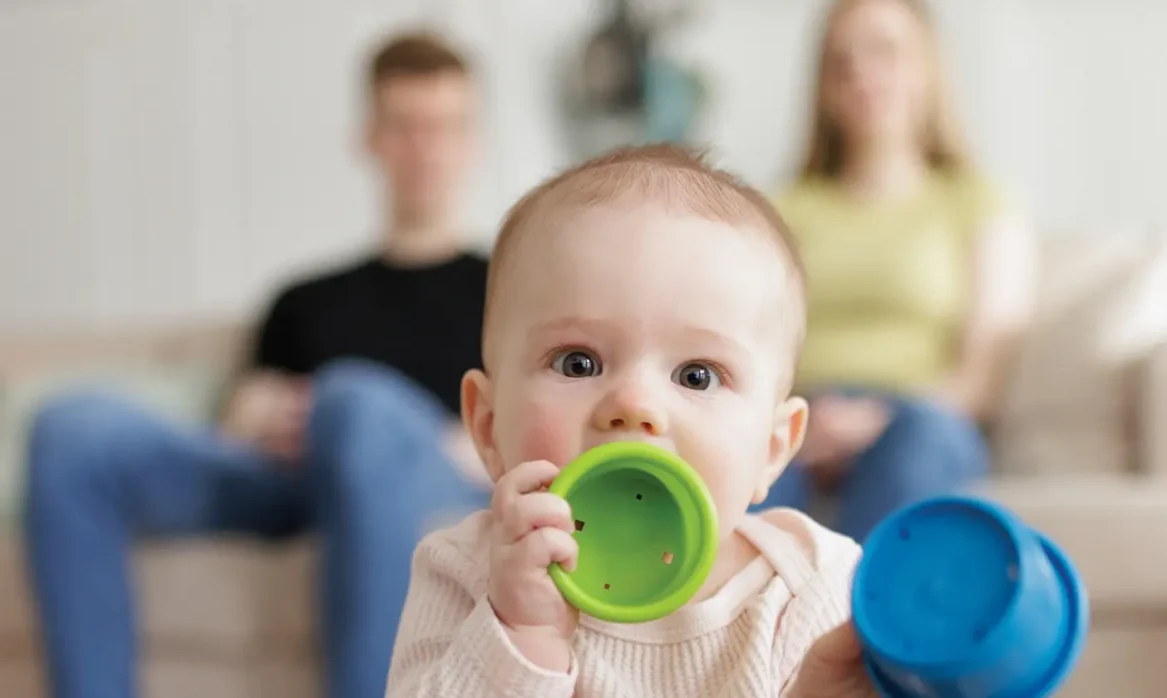The Perfect Problem

How growth, grace, and learning can replace toxic perfectionism.
By Brooklyn Hughes Roemer (BA ’22) in the Spring 2025 Issue
Illustrations by Richard Mia
Surrounded by scholarship winners and ACT acers, 16-year-old W. Justin Dyer (BS ’04) felt inconsolably mediocre. “I just felt like, man, I’m so middle of the road. I wanted to be good at something,” he remembers. So he auditioned for his high school’s top choir. “The day I didn’t make it in absolutely crushed me. And I remember thinking, ‘Honestly, what’s the point? If I can’t do this, I just feel worthless.’”
But Dyer’s friends wouldn’t let him fall prey to hopelessness. In what he describes as a moment of healing, “they came over to my house with their scriptures . . . and read that ‘the worth of the souls is great in the sight of God’” (D&C 18:10).
Dyer’s teenage fears are not uncommon. Now a professor of religion at Brigham Young University, he studies perfectionism and how what starts as a normal desire to improve can grow into a debilitating problem that tells us we aren’t good enough, we’ll never measure up, and worth is defined by accomplishment (or lack thereof).
Perfectionistic tendencies often manifest in adolescence, “during that time of identity discovery: Who am I? What is my value? What is my worth?” Dyer says. “We tend to look around us to see what other people are doing, and that’s how we base our worth.” And while striving to achieve high goals isn’t a bad thing—after all, we are commanded in the scriptures to “be ye therefore perfect” (Matt. 5:48)—an unhealthy form of perfectionism can creep in if we haven’t left room for mortal mistakes and divine mercy.
With a group of BYU students, professors, and alumni, Dyer sought to better understand perfectionism and how it can become a mental trap. He recently guest edited a special issue of BYU Studies devoted to new BYU research on the topic. The researchers’ findings can help parents and adolescents start conversations about perfectionism and give anyone who struggles the tools to tackle unhealthy perfectionistic mindsets.
A Toxic Turn
When one of Mark D. Ogletree’s (BA ’87) former clients was in high school, she wanted to stand out, but she felt the weight of her older siblings’ successes. And in a family with many siblings, there were a lot of accomplishments to compete with. “They were everything from homecoming queen to homecoming king, played all the sports and excelled,” says Ogletree, a Church history professor and marriage and family therapist. Worrying she would look like a failure by comparison, especially when it came to sports, this teen turned down opportunities to play, thinking she would fail.
“That’s what perfectionists do,” Ogletree says. We often associate perfectionism with success and high achievement, and for good reason, says Ogletree: “There is a part of perfectionism that’s healthy, and that’s the part that says, ‘Hey, become something, do something with yourself, and achieve all these goals.’” But that same drive can also paralyze us.
“It is good to strive for high ideals and goals,” adds Dyer. “It just becomes toxic when we see mistakes as an indication of worthlessness.” That reaction is part of what researchers call toxic perfectionism, which demands high expectations but “does not recognize that we will make mistakes,” Dyer says. Instead, it tells us not to risk failure, because failure is an inescapable identity.
BYU alum and clinical psychologist Debra Theobald McClendon (BS ’99, PhD ’09) tells of clients who feel overwhelmed studying. “If I put in a lot of work and don’t get a 100 percent, it means I did something wrong or am not intelligent enough or don’t work hard enough,” one explained to McClendon, as she notes in her BYU Studies article. “It’s ultimately more disappointing than not studying and getting an 87. It’s better to say I didn’t try than to say I failed.”
While toxic perfectionism often shows up in academics, it can also infiltrate other aspects of life. The pressure to be “the perfect _______” can lead to body image issues, eating disorders, and the financial stress of keeping up with constantly changing trends, all in an attempt to maintain an image of health, beauty, or popularity.
And the research indicates that rates of toxic perfectionism are higher in today’s youth than they were in previous generations. An analysis published by the American Psychological Association shows perfectionism rose significantly in college students between 1989 and 2016. Dyer attributes this, in part, to social media use: “We’re no longer just comparing ourselves to the people who are around us. We’re also comparing ourselves to almost the entire population of the world.” Social media sets unrealistic expectations by curating the best moments from people’s lives, often filtered and embellished—sometimes even AI generated.
Economic and social expectations are also increasing. From an early age, kids feel the pressure to crush the ACT, make the cut for the soccer team, get elected class president, get into a top university, and start a successful career immediately after college graduation. In the face of such expectations, a poor high school test grade can seem to spell existential doom for a teen’s prospects for happiness.
So where is the line dividing a healthy drive for success and toxic perfectionism? The researchers say it can be hard to spot. But parents of high achievers can watch for a few warning signs.
Jenet Jacob Erickson (BS ’97, MA ’00), a religion professor and family life researcher, says parents can watch how their children respond to failure. “Are they really dysregulated by what they perceive as failure?” Nobody likes failing, but especially strong reactions—be they tantrums, panic attacks, or depressive episodes—can signal that perfectionism is at play.
Ogletree says problematic perfectionism may show up in a person’s relationships with family and friends. When someone is struggling with certain forms of perfectionism, “you’re actually comparing yourself to your friends . . . and people [notice] that.” It can feel like every conversation is a competition.
Unreasonable—and often unnecessary—standards or expectations are another perfectionism warning sign, says McClendon. One client told her, “I believed anything less than 100 percent was a personal and moral failure.” A rigid mindset, with all-or-nothing thinking and unreasonable standards, can manifest in extreme behaviors like restrictive dieting to achieve a certain body size or excessive praying out of fear that leaving something out will lead to dire consequences.
An Unintended Inheritance
Was something wrong with her baby? Or maybe herself as a parent? Jenet Erickson remembers thoughts like these flooding her mind as she sat in the mother’s lounge at church with two other young mothers, watching their three infants. The other mothers’ babies—younger than Erickson’s daughter—crawled around on the floor. Her baby hadn’t yet learned to crawl, and Erickson felt acutely aware of the developmental differences. “I felt confronted with the uncomfortable reality that as young as [my daughter] was, my own identity and feelings about myself were wrapped up in her successful developmental attainments,” Erickson shares in BYU Studies.
It is a common parental preoccupation. “We’re investing so much, and how they turn out becomes such an indicator of us,” says Erickson. “Was I a good parent? Am I a good person?” When parents’ love gets mixed up with their desire for the child to achieve highly—and thereby validate their parenting—it can weigh on the child.
“Kids are really perceptive,” Erickson says, and they can inherit unhealthy perfectionistic mindsets from their parents: “When parents have high expectations for their children, frequently express criticism or disappointment, and then withdraw love by either not being as happy, not being as loving, not being as connected, then children are more likely to develop toxic perfectionism.”


Erickson says children are particularly on the lookout for parental fear or disappointment. She sees it in her children’s elevated anxiety when she checks their grades online. “They are going to be very sensitive to any parental fear. So a sense that Mom’s afraid I’m not enough, Mom’s afraid I didn’t do well enough, Mom’s afraid I’m insufficient—children are going to be sensitive to because their safety as a person depends on the security of that relationship.”
Erickson says placing high, inflexible expectations on children can also increase perfectionism by restricting their ability to choose their path and develop their innate talents. “In Elder Uchtdorf’s language, you create the soil from which they grow, but you don’t determine the flower—it came divine.” While the desire to control or compel a child to achieve highly may be motivated by a desire to improve their chances at future happiness, “they’re here to learn how to be choosing a life of goodness for themselves,” she says. “It would not be goodness if it were just to please us.”
A Precursor
“I know that God hates me,” a 16-year-old boy declared through tears in a therapy session with Ogletree. “I mess up every week, and I keep failing,” he said of his struggle with pornography use. His troubling track record, it seemed to him, was clear evidence that he was a failure, unworthy of God’s love.
“I don’t know if you know much about Heavenly Father, but let’s talk about it for a minute,” Ogletree told him. “He’s compassionate and He’s loving and He’s happy and He’s hopeful. And if He were here today, He probably would put His arm around you and say, ‘Don’t worry. Just keep trying. I’m with you.’”
Perfectionism rarely shows up on its own, says Ogletree, who describes it as a precursor: “Usually with depression and anxiety, there’s some element of perfectionism that’s fueling that.” It can also contribute to addiction, obsessive-compulsive disorder (OCD), scrupulosity (sometimes called religious OCD, involving behaviors like over-confessing and preoccupation with one’s standing with God), suicidality, eating disorders, insomnia, and relationship dysfunction.
And these disorders can also contribute in turn to unhealthy perfectionism, Ogletree says. Perfectionism may lead to anxiety at age 12, for example, but then anxiety may fuel perfectionism at age 16, as the challenges interact in a cycle, feeding on each other.
McClendon has had many clients come through her office who struggle with perfectionism, OCD, and scrupulosity. She says they often misunderstand the doctrine of the Atonement.
One client, a married man in his mid-40s, was overwhelmed by scrupulosity: “Although he was temple worthy, he avoided the temple for years because of plaguing thoughts about his imperfections,” McClendon writes in BYU Studies. The client expressed his belief that God was “hardly ever satisfied” with his performance and was “often disappointed because He knows I could have done better.” His desire to be perfect juxtaposed with the reality of his imperfections and his belief in an unforgiving God became a roadblock for his testimony and a source of debilitating anxiety.
Such people “love Jesus Christ. They’re trying to follow Him. They would never consciously say, ‘I don’t want Jesus’s help,’” McClendon says. “But when we have someone struggling with toxic perfectionism, it’s actually what they’re doing, even though they don’t realize it. It’s denying the role of Jesus Christ.”


When perfectionism manifests in religious practice, it often shows up as made-up rules. Emma T. Moore (’26), a psychology student who contributed to the research, has noticed scrupulosity in her peers. “People start out with a desire to do good and be good, and then they let that spiral,” she says. “We start making up these rules for ourselves that aren’t there.”
Ogletree saw this when talking to a couple who were “convinced that their place in heaven is going to be contingent on how often they go to the temple,” he says. There is no rule that specifies how many times someone should go to the temple each month, but for this couple struggling to measure their success in gospel living, they’d created one.
McClendon says freedom from perfectionism and scrupulosity is “rooted in doctrine.” A correct understanding of the doctrine of the Atonement of Jesus Christ can replace the fear fueling scrupulous behaviors with peace that “becoming perfected in Christ is a . . . process only possible through his grace,” she writes in BYU Studies. Or as Elder Jeffrey R. Holland (BS ’65, MA ’66) taught in a 2017 general conference, “Our only hope for true perfection is in receiving it as a gift from heaven—we can’t ‘earn’ it.”
How Parents Can Help
“We think it’s about being perfect,” says Erickson. But being the perfect athlete, the perfect student, the perfect believer has never been a realistic goal for this life. “This is about growth, this is about grace, this is about learning. This was not ever about being perfect.”
The BYU researchers offer several suggestions for parents to help their children learn to accept imperfection and adopt a growth mindset:
Challenge Perfectionistic Thoughts
McClendon says posing a simple question can bring perspective: “Would you be saying to [a friend or family member] the things you’re saying to yourself? As humans, we all make mistakes. We’re not perfect. We don’t have an error-free performance. You deserve the same kind of care that you’re giving [others].”
Reframe Identity Beliefs
“When [my oldest daughter] was in grade school,” Dyer says, “she went to do a presentation in front of her class, and she totally messed up.” When Dyer asked her what she learned from the experience, she responded “that I’m a scaredy-cat.” Dyer says in situations where children come up short, parents should help them understand the difference between identity beliefs and behaviors. Perfectionism can make mistakes feel like an identity we can’t escape, but behaviors are much more easily changeable.
Emphasize a Growth Mindset
Parents can discuss goals with children and “have a conversation on flexibility . . . in advance,” says McClendon. If a child is struggling to achieve a goal, parents can discuss whether the goal should be adjusted, how to set smaller goals to reach the larger goal, why the goal feels important to the parent or child, and how they will react in the future if the goal is not met.
Prioritize Learning
“The greatest gift I can give a child is [to know] that they are acceptable in their learning,” says Erickson. For children who may feel overwhelmed by goals and expectations, Ogletree suggests celebrating growth by asking, “What are you learning?” no matter where they are along their journey to achieving a certain goal.
React with Love
When children fall short of expectations or make mistakes, it’s crucial for parents to “demonstrate our love and care for them,” Dyer says. “We describe that what they’ve done is incorrect but then help them along the path toward improving in a loving, supportive manner.”
Seek Professional Help
When rigid perfectionism combines with other mental health issues, creates high distress, or makes daily living difficult, the BYU researchers suggest seeking professional help. McClendon helps clients overcome perfectionism through thought charts, behavioral experiments, shame-attacking exercises, and other methods. We “should be able to live life without being miserable,” McClendon adds. “‘Men are that they might have joy’ (2 Ne. 2:25), and our quality of life matters.”
Perfectly Imperfect
One night as her family knelt for prayer, Erickson’s husband paused to apologize. Both parents had raised their voices at their kids that evening. “I want you to know that without Jesus Christ, we would be trapped by this moment forever,” he told their children. “We couldn’t get past it. I have done wrong, Mom has done wrong to you, and we would be stuck. But because of Him, we can grow from this moment, and He will help us and heal us.”
In that moment, Erickson and her husband allowed their kids to see them as imperfect. Erickson emphasizes the importance of acknowledging openly with children, “I will love you imperfectly. I have my own weaknesses that I’m struggling with. I’m dysregulated in these ways,” and then helping children understand that mistakes and weaknesses are a part of progressing. “We just say them out loud, and this is actually part of mortality,” she says.
When we focus less on our goal and more on the process of getting there, the BYU researchers explain, we can set ourselves up to accept mistakes as milestones along the road. “It’s not so much about achieving this goal right here,” says Ogletree. It’s “what are you learning along the way?” An unflinching focus on the goal can often distract us from the simple joy of learning and growing.
Instead of getting mired in our imperfections, the good news of the gospel can be the solution, says Dyer: “It’s so much better to build ourselves up with the reality of our infinite worth. . . . Even though I might be struggling, I can hold my head high. I’m a child of God.”
Read more insights about avoiding and addressing toxic perfectionism in issue 63:4 of BYU Studies.
Feedback Send comments on this article to magazine@byu.edu.





